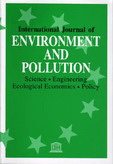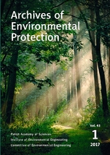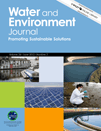
Environmental Sciences Europe
Scope & Guideline
Shaping sustainable futures through open research.
Introduction
Aims and Scopes
- Ecotoxicology and Risk Assessment:
The journal publishes studies that assess the ecological risks posed by pollutants, including heavy metals, pesticides, and pharmaceuticals, emphasizing their effects on aquatic and terrestrial organisms. - Climate Change and Environmental Policy:
Research related to the impact of climate change on ecosystems and the effectiveness of environmental policies aimed at mitigating these effects is a significant focus area. - Water Quality and Management:
The journal covers various aspects of water quality assessment, including the monitoring of contaminants, the impact of agricultural practices, and innovative treatment methods. - Biodiversity and Ecosystem Services:
Studies exploring the relationship between biodiversity and ecosystem services, including the effects of land use changes and pollution on species and habitats, are regularly featured. - Emerging Contaminants and Microplastics:
Research on the occurrence and effects of emerging contaminants, including microplastics, and their implications for environmental health and safety is a growing area of interest. - Sustainable Resource Management and Circular Economy:
The journal emphasizes research that promotes sustainable practices in resource management, including waste reduction, recycling, and the adoption of circular economy principles.
Trending and Emerging
- Climate Resilience and Adaptation Strategies:
Research focusing on developing strategies to build resilience against climate change impacts, including adaptation practices in agriculture and urban planning, has gained significant traction. - Innovative Remediation Technologies:
Emerging studies on innovative technologies for pollution remediation, including bioremediation and advanced materials for contaminant removal, are increasingly featured. - Transdisciplinary Approaches to Environmental Challenges:
There is a growing trend towards transdisciplinary research that integrates knowledge across disciplines to address complex environmental issues, reflecting a holistic view of sustainability. - Health Impacts of Environmental Pollution:
Research examining the direct links between environmental pollution and public health outcomes, particularly in the context of air quality and chemical exposure, is emerging as a critical area of focus. - Sustainable Agriculture Practices:
The journal is increasingly publishing studies on sustainable agricultural practices that minimize environmental impacts while ensuring food security, reflecting the importance of agriculture in environmental science. - Impact of Extreme Weather Events:
Research analyzing the consequences of extreme weather events, such as floods and droughts, on ecosystems and human communities is becoming more prominent, particularly in the context of climate change.
Declining or Waning
- Traditional Chemical Pollution Studies:
Although still relevant, studies focused solely on traditional pollutants without considering their interactions with newer contaminants or emerging issues have seen a decline in frequency. - Single-Species Toxicity Testing:
There is a noticeable shift away from single-species toxicity assessments towards more complex, ecosystem-level studies that examine interactions among multiple species and stressors. - General Environmental Monitoring:
Research that merely monitors environmental parameters without a specific focus on their implications for health or policy is less common, as studies increasingly aim for applied outcomes. - Historical Environmental Studies:
While historical studies provide valuable insights, there has been a decline in publications focused on past environmental conditions without direct relevance to current challenges. - Local Case Studies:
Research that is limited to local case studies without broader implications or connections to global environmental issues appears to be decreasing in favor of more comprehensive, comparative studies.
Similar Journals

INTERNATIONAL JOURNAL OF ENVIRONMENT AND POLLUTION
Connecting Research and Policy for a Healthier EnvironmentInternational Journal of Environment and Pollution is a pivotal publication in the field of environmental science, dedicated to advancing knowledge concerning pollution and its multifaceted impacts on ecosystems and human health. Published by InderScience Enterprises Ltd, this journal, which has been in circulation since 1991, serves as a vital platform for researchers, professionals, and students interested in the management, monitoring, policy, and law associated with environmental issues. With an ISSN of 0957-4352 and E-ISSN 1741-5101, it offers a critical perspective on pollution challenges, emphasizing Waste Management and Disposal. Although placed in the Q4 quartile of its categories, it remains an important resource for understanding the complexities of environmental impact, contributing to policy formulation and ecological research. The journal does not offer Open Access, but it can be accessed through various academic libraries and institutions that value comprehensive studies in environmental management. Engage with the latest findings and discussions that address pressing environmental concerns today!

Euro-Mediterranean Journal for Environmental Integration
Fostering Collaboration to Tackle Environmental Challenges Head-OnThe Euro-Mediterranean Journal for Environmental Integration, published by SPRINGER HEIDELBERG, serves as a pivotal platform for interdisciplinary research in the realm of environmental science, particularly focused on the unique ecological and socio-economic context of the Euro-Mediterranean region. With its ISSN 2365-6433 and E-ISSN 2365-7448, this journal aims to foster a collaborative approach to environmental challenges, integrating insights from various fields such as ecology, geography, and sustainable development. Since its inception in 2016, it has made significant strides, achieving a Q3 ranking in Environmental Science and maintaining a notable position within the Scopus rankings, sitting at #102 out of 233 in the general environmental science category, which reflects its growing influence in academic discourse. The journal is committed to open dialogue among researchers, professionals, and students aimed at advancing knowledge and promoting innovative solutions to pressing environmental issues. Access to its comprehensive articles and findings will be key to contributing to a more sustainable future.

Rocznik Ochrona Srodowiska
Exploring Innovative Solutions for Environmental ChallengesRocznik Ochrona Srodowiska, published by the Middle Pomeranian Scientific Society for Environmental Protection, is an esteemed journal dedicated to advancing the field of environmental science in Poland and beyond. With an ISSN of 1506-218X, this peer-reviewed journal has established itself as a vital resource since its inception in 2007, addressing various environmental issues and promoting sustainable practices. Currently holding a Q3 category ranking in the Environmental Science (miscellaneous) field for 2023, it places itself in the 23rd percentile of Scopus rankings, reflecting a growing influence in the broader environmental research community. While the journal is not open access, it serves as an important conduit for researchers, professionals, and students to disseminate their findings and contribute to the interdisciplinary dialogue aimed at tackling pressing environmental challenges. With a commitment to rigorous research and practical applications, Rocznik Ochrona Srodowiska remains an essential platform for fostering innovation and collaboration in environmental studies.

EQA-International Journal of Environmental Quality
Unlocking insights for a healthier planet.EQA-International Journal of Environmental Quality, published by the University of Bologna, Department of Agricultural Sciences, is a premier open-access journal dedicated to the multidisciplinary exploration of environmental quality issues. Established in 2009, it aims to foster a greater understanding of the intricate interactions between human activities and environmental health. With a focus on innovative research, the journal contributes to the advancement of knowledge across diverse fields, making it an essential resource for researchers, professionals, and students engaged in environmental science and sustainability. The journal operates with an emphasis on accessibility, ensuring that critical findings reach a global audience without barriers. With an impressive Scopus rank of 88 out of 171, EQA stands as a significant platform for disseminating impactful research that informs policy and promotes environmental stewardship.

Journal of Environmental Science and Management
Exploring critical issues in environmental policy and management.Journal of Environmental Science and Management, published by the University of the Philippines Los Baños College, serves as a vital platform for disseminating research findings and innovations in the field of environmental science and management. With an ISSN of 0119-1144, this journal aims to foster multidisciplinary discussions and advancements in sustainability practices and environmental policy, primarily focusing on the unique challenges faced in the Philippines and similar ecological contexts. Despite being categorized in the Q4 quartile for Environmental Science (miscellaneous) and holding a SCOPUS rank of #191/233, it provides crucial insights and practical solutions for a diverse audience ranging from researchers to policymakers. While it does not currently operate under an open-access model, its commitment to quality research continues to make it a notable source in the environmental science community. The journal covers a broad timeframe from 2011 to 2024, capturing evolving dynamics in the environmental landscape. Contributing to this journal not only enhances the visibility of local and regional environmental research but also aids in addressing global environmental challenges.

Resources Environment and Sustainability
Advancing the Future of Environmental Science and SustainabilityResources Environment and Sustainability is a premier academic journal published by ELSEVIER, dedicated to advancing knowledge in the fields of environmental science, engineering, and sustainability practices. Recognized for its rigorous peer-review and high-quality research, the journal boasts an impressive impact factor and consistently ranks in the first quartile across multiple categories, including Environmental Engineering, Environmental Science, Management, Monitoring, Policy and Law, and Pollution. With its Scopus rankings placing it among the top journals—#7 in Environmental Science and #12 in Environmental Engineering—this journal provides a vital platform for researchers, professionals, and students seeking to contribute to evolving policies, innovative management strategies, and cutting-edge environmental solutions. Hosted in the Netherlands, Resources Environment and Sustainability is committed to fostering interdisciplinary dialogue and disseminating high-impact research that addresses the pressing challenges of our times. This journal embraces open access principles, ensuring that the wealth of knowledge it publishes remains accessible to a global audience.

Archives of Environmental Protection
Connecting Scholars to Drive Ecological ProgressArchives of Environmental Protection, published by the Polish Academy of Sciences, is a pivotal journal in the field of Environmental Science. With an ISSN of 2083-4772 and E-ISSN of 2083-4810, this journal serves as a critical platform for disseminating innovative research and comprehensive reviews that address the complexities surrounding environmental issues. As of 2023, it holds a respectable Q3 ranking in Environmental Science, reflecting its relevance and contribution to the academic community, indicated by a Scopus rank of 124 out of 233 in the General Environmental Science category. Although it operates without Open Access, the journal's consistent publication from 2007 to 2024 emphasizes its commitment to advancing knowledge in diverse areas of environmental protection. Researchers, professionals, and students are encouraged to engage deeply with the wealth of insights offered through the rigorous peer-reviewed articles presented in this journal, which strive to foster sustainable practices and environmental stewardship.

Frontiers of Environmental Science & Engineering
Unveiling cutting-edge methodologies for a sustainable tomorrow.Frontiers of Environmental Science & Engineering is a premier journal published by HIGHER EDUCATION PRESS that stands at the forefront of interdisciplinary research in environmental science and engineering. Established in 2013 and converging its scope through 2024, this journal has swiftly ascended to a notable Q1 category in the Environmental Science (Miscellaneous) segment, highlighting its remarkable impact and relevance. With a Scopus ranking of 27 out of 233 in its field, placing it within the top 88th percentile, it serves as a crucial platform for disseminating cutting-edge research, innovative methodologies, and pressing environmental concerns. Researchers, professionals, and students alike will find valuable insights and opportunities for collaboration within its pages. While the journal operates under a subscription model, its commitment to advancing the field makes it an essential resource for those dedicated to addressing the world's environmental challenges, fostering sustainable practices, and pioneering engineering solutions.

Advances in Environmental Research-An International Journal
Driving Change through Scholarly DiscourseAdvances in Environmental Research is an international journal published by TECHNO-PRESS, dedicated to advancing our understanding of environmental science and sustainability. Operating with an ISSN of 2234-1722 and an E-ISSN of 2234-1730, this journal serves as a premier outlet for researchers, professionals, and students aiming to share pioneering research findings, case studies, and reviews that address contemporary environmental challenges. The journal aims to provide a platform for scholarly discussion on a wide range of topics, including pollution control, resource management, and ecological conservation. Though currently classified as a non-open access journal, it remains accessible through various institutional subscriptions, allowing a broad audience to engage with its content. Committed to fostering academic collaboration and innovation, Advances in Environmental Research plays a crucial role in informing policymakers and the scientific community about emerging trends and solutions in environmental studies, making it an essential resource for those dedicated to creating a sustainable future.

WATER AND ENVIRONMENT JOURNAL
Pioneering interdisciplinary research in water resource management.WATER AND ENVIRONMENT JOURNAL is a prominent interdisciplinary journal dedicated to the latest research and advancements in the fields of water resources, environmental engineering, and pollution management. Published by WILEY, the journal has established itself as an essential resource for academics, practitioners, and policymakers since its inception in 1987. With an impressive impact factor reflecting its robust influence, it ranks in the Q2 and Q3 quartiles across multiple categories, including Water Science and Technology, Environmental Engineering, and Management, Monitoring, Policy and Law. The journal welcomes high-quality research articles, reviews, and case studies that address the critical challenges facing water and environmental sciences. As an open access publication, it provides a platform for widespread accessibility and engagement, ensuring that the knowledge generated is disseminated to a diverse audience. With a commitment to advancing understanding and solutions in water-related issues, WATER AND ENVIRONMENT JOURNAL plays a crucial role in shaping the future of environmental research and technology.